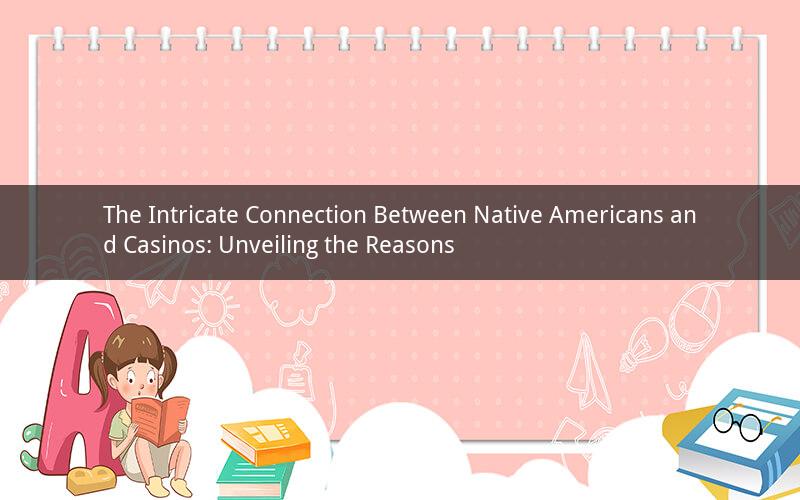
Casinos and Native Americans have been intricately connected for decades, a relationship that has sparked numerous debates and discussions. This essay delves into the reasons behind why Native Americans are often associated with casinos, examining the historical, cultural, and economic factors that have contributed to this association.
Historical Background
The historical context plays a crucial role in understanding the connection between Native Americans and casinos. For centuries, Native American tribes have faced discrimination, marginalization, and the loss of their lands. The Indian Gaming Regulatory Act (IGRA) of 1988 provided an opportunity for tribes to gain economic independence by establishing casinos on their reservations.
Cultural Significance
Native American culture is rich and diverse, with many tribes having a long history of gambling and gaming. In many tribes, gambling was a traditional form of entertainment and a way to bring communities together. By establishing casinos, Native American tribes are able to preserve their cultural heritage and promote their unique traditions.
Economic Empowerment
Economic empowerment is a significant reason for the association between Native Americans and casinos. The revenue generated from casinos has been instrumental in providing tribes with the resources to improve their communities, invest in education, and provide healthcare. This economic independence has allowed tribes to regain a sense of self-sufficiency and dignity.
Legal and Political Considerations
The IGRA of 1988 and subsequent amendments have been instrumental in establishing the legal framework for tribes to operate casinos. This legislation has enabled tribes to enter into compact agreements with state governments, ensuring that the casinos are regulated and taxed appropriately. However, legal challenges and political opposition have often threatened the success of Native American casinos.
Environmental and Social Impact
The construction and operation of casinos have raised concerns regarding their environmental and social impact. Critics argue that casinos can lead to increased crime, gambling addiction, and other negative consequences. Despite these concerns, many tribes have taken measures to mitigate these impacts and promote responsible gaming.
Case Studies
To better understand the connection between Native Americans and casinos, it is essential to examine case studies of tribes that have successfully established and operated casinos. The Seminole Tribe of Florida and the Pechanga Band of Luiseño Indians are examples of tribes that have transformed their communities through casino gaming.
1. Seminole Tribe of Florida: The Seminole Tribe of Florida has become one of the most successful Native American tribes in the United States, thanks in part to their lucrative casinos. The tribe has used the revenue generated from their casinos to improve their community, invest in education, and provide healthcare. They have also established a scholarship program to support Native American students.
2. Pechanga Band of Luiseño Indians: The Pechanga Band of Luiseño Indians operates one of the largest casinos in California, the Pechanga Resort and Casino. The tribe has used the revenue generated from their casino to improve their community, invest in education, and provide healthcare. They have also established a scholarship program to support Native American students.
Conclusion
The association between Native Americans and casinos is complex, with historical, cultural, economic, legal, and social factors contributing to this relationship. While casinos have provided Native American tribes with a means to gain economic independence and preserve their cultural heritage, they have also raised concerns regarding their environmental and social impact. As the gaming industry continues to evolve, it is crucial for Native American tribes and the broader society to work together to ensure that casinos contribute positively to the well-being of all communities involved.
Questions and Answers
1. What is the significance of the Indian Gaming Regulatory Act (IGRA) of 1988 in the relationship between Native Americans and casinos?
Answer: The IGRA of 1988 provided a legal framework for tribes to establish casinos on their reservations, enabling them to gain economic independence and preserve their cultural heritage.
2. How have casinos contributed to the economic empowerment of Native American tribes?
Answer: Casinos have generated significant revenue for tribes, which has been used to improve communities, invest in education, and provide healthcare, leading to economic empowerment.
3. What are the cultural significances of gambling and gaming in Native American culture?
Answer: In many tribes, gambling and gaming were traditional forms of entertainment and a way to bring communities together, contributing to the preservation of cultural heritage.
4. What are the environmental and social impacts of casinos on Native American communities?
Answer: Casinos can lead to increased crime, gambling addiction, and other negative consequences, raising concerns about their environmental and social impact on communities.
5. How have successful tribes, such as the Seminole Tribe of Florida and the Pechanga Band of Luiseño Indians, used casino revenue to improve their communities?
Answer: Both tribes have used casino revenue to invest in education, healthcare, and community improvements, contributing to the well-being of their communities and promoting economic independence.